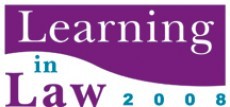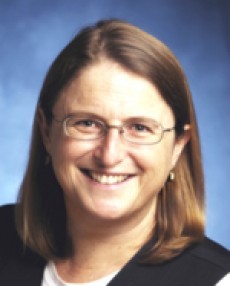Keynote speakers at 2008 Conference

Keynote speakers at Learning in Law Annual Conference 2008 were Avrom Sherr, Institute of Advanced Legal Studies, and Sally Kift, Queensland University of Technology, Australia.
Avrom Sherr
The title of Avrom’s address was Language cuckoos, cultural hegemony and legal education in the EU: the ‘commonisation’ of European law.
Legal education on the European mainland is different from that in the UK, but this may be changing. The 25 civil jurisdictions in the European Union speak 22 of the EU’s official languages and the two common law jurisdictions speak English, but recent research suggests that English is becoming the ‘lingua franca’ for the study of law and common law the most frequent ‘foreign law’ studied. The pressures of globalisation may be bringing about an irresistible linguistic hegemony.
What is this doing to Europe and legal education in mainland Europe? What do they know that we don’t know? And what effects might this have on our own possession, custody and control over the English language, the common law and the culture and values of common law legal education? Is this the ultimate in transnational curricular integration?
Avrom is Director and Woolf Professor of Legal Education at the Institute of Advanced Legal Studies (IALS) at the University of London. His main interests are legal education, human rights, the sociology of the legal profession and ethics, and he was the principal architect of the concept and system of competence assessment in publicly funded legal aid work.
Avrom is the founding editor of the International Journal of the Legal Profession. He was the project leader producing the Law Society’s seminal report Willing blindness (1998) on regulation of the legal profession, and has coordinated a number of trans-European projects. He currently sits on the Advisory Board to the Legal Services Complaints Commissioner and is Chair of UKCLE’s Advisory Board.
Sally Kift
The title of Sally’s address was Curriculum design challenges for 21st century legal education.
Recent decades have witnessed dynamic change in the working environment of 21st century lawyers. Legal practice has been transformed by external drivers such as globalisation, competitiveness and competition reform, and developments in information and communications technology, as well as by a determined move away from the adversarial system as the primary dispute resolution method.
Similarly, higher education has been subjected to dramatic change from a range of (remarkably comparable) external drivers, and particularly by the demand that students graduate with a profile of knowledge, skills and attitudes that include, but go beyond, the disciplinary expertise or technical knowledge that traditionally formed the core of most university courses. This latter has been driven by the imperative to prepare students more effectively for the changing, challenging and diverse globalised work environments into which they will enter as professionals and citizens.
While the practice of law and the context of higher education have changed radically, curriculum renewal in legal education still struggles to keep pace. Legal educators face significant conceptual challenges in meeting the persistent demands for curriculum innovation and quality assurance. Further, at a time when higher education has renewed its focus on learning and teaching professionalism and the quality of the student experience, the current fraught reality for all – academics and students alike – is that we need to be more effective and efficient in our daily practices and educational engagements.
Sally’s paper provided an environmental scan of legal education internationally and considered the challenges inherent in educating graduates for the demands of 21st century legal practice and globalised work environments, offering some ideas as to how changes in curriculum design might support new learners and meet the imperatives of teaching, learning and assessing for the new learning objectives being embraced.

Sally is Carrick Senior Fellow and a Professor of Law at Queensland University of Technology, where she is currently seconded to the Chancellery as the director of a first year experience project. She was responsible for teaching and learning in the Faculty of Law for five years. Sally’s research interests include legal education, the first year experience, staff development and the teaching, learning and assessment of graduate attributes and transferable skills.
She received a National Teaching Award in 2003, and in 2006 was awarded one of three inaugural Carrick Institute Senior Fellowships. In 2007 a project team she led was awarded a further National Teaching Award for the Faculty of Law’s assessment and feedback practices.
Last Modified: 9 July 2010



Comments
There are no comments at this time